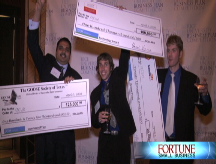Sprinting toward less stinky sportswear
A fledgling sportswear firm smells success for its odor-free running clothes.
 |
| From left: Nolia's Eric Johnson, Sarajane Sparks, Danvers Fleury, Chris Lear, and John Lerch |
(Fortune Small Business) -- If you've ever put on just-washed workout clothes only to find they still smell like the gym, you're not alone. That's what MBA students at the University of North Carolina's Kenan-Flagler School of Business found while conducting research for their sportswear startup, Nolia Athletic Apparel. The students surveyed runners, many of whom said their athletic clothing stayed stinky and also chafed.
"This was our market opportunity," says Nolia CEO Danvers Fleury.
The startup competed at the 2008 Rice Business Plan Competition - co-sponsored by FSB - and came in eighth out of 36 finalists. Judges liked Nolia's concept and strong team. Fleury, 28, founded two online firms as a college undergraduate and managed several other startups. Nolia's director of sales and business development, Chris Lear, 33, is a former college track star who wrote Running With the Buffaloes, a book about the men's cross-country team at the University of Colorado.
To handle marketing and design, Nolia tapped Sarajane Sparks, 29, a former fashion writer and public relations executive. (While working for Kai, a luxury fragrance firm, Sparks secured a spot for one of the company's products on The Oprah Winfrey Show.) Eric Johnson, 28, who is pursuing both an MBA and a law degree, is Nolia's CFO. Rounding out the team is CTO John Lerch, 28, an electrical engineer with five patents to his name and ten more pending.
Nolia expects to secure its first round of funding in about ten months and is now focused on refining technology that will allow it to tackle runners' issues. To kill odor, Nolia fabrics will be treated with chitosan - an antimicrobial substance that wards off odor-causing bacteria and fungi and is found in crustacean shells. (Chitosan is also used in a wound dressing that FSB wrote about in "Shrimp Bandages," July/August 2006.)
The Nolia team says that its all-natural treatment is more eco-friendly than chemicals or silver. (See FSB's "Silver to Gold," September 2006.) A recent Arizona State University study found that the silver used to fight odor in other fabrics could end up in groundwater. And chitosan is cheaper than silver, selling for about $2 an ounce, vs. $17 for the precious metal.
Nolia will focus on comfort, too, designing clothes with wider neck openings, more vents in high-perspiration areas, and soft seams made with heat-applied adhesive rather than stitches. Clothes will be made in North Carolina with recyclable fabric, and shoppers who turn in their old Nolia styles will get credits to help buy new ones.
Nolia plans to launch in specialty running stores using sponsored athletes as sales reps to establish its credibility and spur publicity. The firm will also sell on its Web site. Fleury sees the site mostly as an option for shoppers who can't find Nolia clothes at nearby stores. Website prices will never undercut brick-and-mortar prices.
Some contest judges, including Bo Bothe, president of Houston branding firm BrandExtract, question parts of Nolia's strategy. Bothe thinks Nolia should join with specialty stores to sponsor races.
"And they should seek shelf space in small retail chains - it's a faster way to a bigger network," he says.
Using athletes to sell is innovative, says contest judge Cindy Lindsay, a principal with Boulder consulting firm FLS Associates. But she worries that they lack the required experience.
"To get a foothold in stores, you need savvy salespeople," she says.
But Fleury's team thinks local athletes can win over running-store staffs. Fleury knows the tactic is unusual. "There's doubt because it won't work like a typical sponsorship, but we feel it will be key to our success."
UPDATE: Since this story was reported, Nola has gone on hiatus to work out kinks in its business plan. One possibility: shifting focus from sweaty gym shirts to stinky running shoes, which CEO Danvers Fleury thinks might be a bigger market. "[T]hat would really shake things up," Fleury wrote in an e-mail message in early June. ![]()
Student grudge match: Read about the 36 winning business plans from the Student Startup competition
A startup's seaworthy plan
Quiz: Do you have what it takes to win a business plan competition?
-
The Cheesecake Factory created smaller portions to survive the downturn. Play
-
A breeder of award-winning marijuana seeds is following the money and heading to the U.S. More
-
Most small businesses die within five years, but Amish businesses have a survival rate north of 90%. More
-
The 10 most popular franchise brands over the past decade -- and their failure rates. More
-
These firms are the last left in America making iconic products now in their twilight. More












